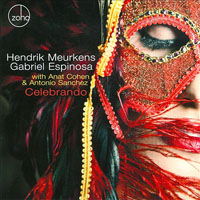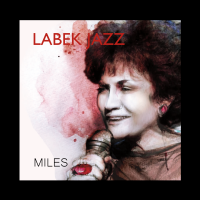Home » Jazz Articles » Talkin' Blues » Talkin' Blues with the Groovemaster, Jerry Jemmott
Talkin' Blues with the Groovemaster, Jerry Jemmott
AAJ: Let's talk a bit about Jaco Pastorius. First, I was wondering how he first came up on your radar, not when you first met him, but when you first heard him.
JJ: From Jimmy Tyrell, who, at the time, was a vice president at Columbia Records. When I came into the business, he was one of the bass players who was in a position of power. He and Bob Bushnell were the black guys doing most of the work, so after Jimmy moved up, Chuck Rainey and I had became the "guys."
So Jimmy would send me a bunch of records, and one of the records he sent me was Jaco's. I remember it distinctly, I'd never heard of him before, and I thought, "Wow, this cat is something!" And then later I found out I was one of his heroes.
Then we met around 1981 or 1982. I was introduced to him by a bass and guitarist named Pablo Nahar. He worked around Europe from his home base in Amsterdam, but he was from Suriname. He gave me Jaco's phone number and I called him up and he came over to my house and we started hanging out.
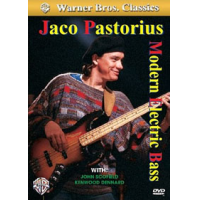 We developed a good relationship, he was good people, he had a clear vision of, as he would say, "leaving something for the kiddies."
We developed a good relationship, he was good people, he had a clear vision of, as he would say, "leaving something for the kiddies." AAJ: What might be something you knew about Jaco that the general audience might not know? When you were hanging out, did you have the feeling you were with someone extraordinary, a genius?
JJ: You knew he was gifted, and he was a bundle of energy. In all the time we spent together we never got high together. We were straight and focused on getting the video done, and it took us four years. He was all about sharing what he had with other people.
AAJ: There a great quote from Jaco, a reporter once asked him where he thought the future of music was heading, and Jaco said something like, "Well, tomorrow I'm heading to Miami." Did you also see him as perhaps the greatest bassist on the planet at that time?
JJ: Oh, without a doubt. He didn't just have a command of the instrument; he had the music in his head. It flowed from the beginnings I came from, and while I might have thought along similar lines, his talent and skill allowed him to accomplish some things I had only thought about.
As human beings we live like monkey-see-monkey-do, so once someone does something, you realize it can be done. He did the things that seemed impossible, and without his example I might not have even considered going in that direction. Like I'd fooled around with harmonics when I began playing electric bass, but I'd never really explored them. He took it to another level. Like most bass players, I had used a harmonic octave in the high register, but he found all the upper harmonics on the instrument that I didn't even know existed.
AAJ: And when he talked to you about filing the frets off of his bass. Now that it's been done, it's like sure, that's an option. But to be bold enough to do that. From playing guitar I would never consider that, because I would have imagined the strings would have rattled or buzzed against the fingerboard.
JJ: Right, it would be the same thing on a fretless bass, it would have to be perfectly arched, and your fingers would have to be in the perfect spot. He just went for it. Then he did the thing with putting polyurethane and epoxy coating on the neck after filing it down to help spaces. He was on it!
AAJ: I wonder if you agree with this, but this idea of overcoming the frets is something important that he shared with Duane. Jaco filed his down, and Duane did it with his slide.
JJ: Hey, that's right! Great analogy. I never thought of it like that, but the slide does give it that bending quality that gets beyond the static note.
AAJ: And, like Jaco, he took the instrument to a new place. He started out in the Elmore James tradition, but when you listen to things he did, like on "Mountain Jam," he used the guitar like a horn and took it to a whole new place.
JJ: It's what made him unique, he went beyond the confines of the stereotypes of what the instrument was, just like what Jaco did with the bass.
AAJ: You know, from reading about Jaco, you get the impression that by the '80s he was kind of out of it, and wild. But on the video you did together he seemed so lucid, and grounded, and funny. So the black-and- white biographical sketches of him that portray him as flipped-out in the '80s aren't necessarily true?
JJ: There might have been some episodes and some events, and he was going through some stuff. But the music was very grounding to him. It gave him a focus, and this video was something he wanted to do, and he didn't want to do it without me, and he stuck to his word.
So what you saw on that video was someone on the job, some of the stuff what was said about him was probably true, and some was probably blown out of proportion. But a lot of things were true that his family and I knew about. He had lost his wife Ingrid, who I believe just passed away this year. But for that video he was grounded.
AAJ: So you guys saw each other regularly during the '80s?
JJ: Yes, but it was generally something to do with this project or some other educational project—teaching and clinics. I might come and hang out with him at a session. He put a band together, but it didn't work out, and that's when I knew things were really getting bad for him. At that time he wasn't getting the respect he should have received from his fellow musicians.
He took a job he probably shouldn't have taken, and when you take those kinds of jobs it rarely works out well. But he took it for the money. Over the time we had been planning this he'd gone through a lot, he'd broken his arm in Europe and it was tough, but he manned-up when we did the video. He showed up early, and we left early. We were there at 8:30 and left an hour and a half early at 3:30—it was scheduled to go from nine to five.
AAJ: Your conversation with Jaco for his Modern Electric Bass video is a great piece of history, a treasure for bass fans, and of course a must for modern electric bass players. You must be pretty proud of that achievement.
JJ: I wanted to promote his music and preserve his legacy, and you know, within the year he was gone. Of course I was shocked, but somehow not surprised. We did that video before we had signed a contract, so the publishers wanted to pay us royalties once a year, and through my work with B.B. King I knew the difference between getting paid quarterly as opposed to semi-annually. And I remember telling them, one of us could die between payments. Then that's exactly what happened.
Jaco was asking for money between payments, and was in jail, and got bailed out. But I believe if he had gotten his payment quarterly and hadn't needed the money, I don't think he would have gotten killed.
AAJ: The interview on the video, that's really difficult what you did, but you made it look so natural. How did you do that, was someone holding up cue-cards or something?
JJ: Well first of all, we'd been working on that for three or four years. From the time we met we'd decided that we were going to do something. We were doing some teaching together and had that going on. So in a sense I was prepared, but I didn't know when it was going to happen. So when it finally took shape, I found out two days prior to the taping. So the night before I wrote down 20 questions, so you might notice me looking at a yellow pad.
AAJ: No I didn't notice that. Because I interview people I was really impressed, and I appreciate how difficult that was.
JJ: I knew what he wanted to get out, so I wrote the questions with that in mind, and I tried to be a little provocative. I wanted to make him look good and keep him in good spirits—you know that was a difficult time for him.
AAJ: In one sense you got paid very well, because when you asked him about some of his primary influences and asked him to pick one, he played one of your own licks back to you and said, "Enough said?" Something like that is cool, but to have it on video, that's priceless, it doesn't get any better than that.
JJ: [Laughing] I wasn't prepared for that! The way he could just summon up something like that, he was just an incredible musician.
For me it's funny because I've never tried to copy anybody, so to hear someone like Jaco do that, it was cool!
AAJ: There's something special about listening to two artists discuss their music and instrument. You worked with Paul Desmond on Bridge Over Troubled Water (A&M, 1969) and I was wondering if you ever listen to his interview with Charlie Parker? It's really cool to hear the two of them talk shop together.
JJ: No! Yeah, Paul was great. I remember we recorded that album at the Hit Factory on 48th Street, and I remember that session well.
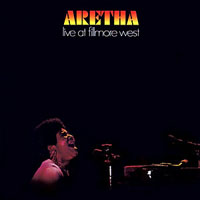 Musical History—Front Row Seat
Musical History—Front Row Seat JJ: It's crazy, all the people like Paul I grew up listening to in the '50s and '60s, I ended up playing with most of them. Not only playing with them, but making records with them. And also the musicians whose names I knew from their records, I ended up playing with them, or being in bands with them.
And not just anything, but some important once-in-a-lifetime stuff, like Gil Scott-Heron's "The Revolution Will Not be Televised," the Rascal's "People Gotta be Free," and "Attica Blues" by Archie Shepp, All these uplifting revolutionary recordings I've been involved with—people like Les McCann and Eddie Harris.
At the studio at Columbia on 30th Street they had this great huge poster of Aretha on the wall. It was a big studio where we would do things with 30-piece orchestras. Before I knew her, I used to go in there and just stare at that photo; she was sitting turned away from the piano with her leg crossed. Honest to God, I used to go in there just to look at that picture. Then I record a song like "Think" with her.
AAJ: It's amazing, not only did you get to play with your heroes, but your contemporaries and friends like Jaco and Duane became music icons.
JJ: There's so many, it's true, Nina Simone and Roberta Flack—I've been truly blessed.
Willie Bridges was a saxophonist in one of the first bands I played with. He introduced me to Conny Boy, Charles Otis, Idris Muhammad, and Lester Young. So he's responsible for me first meeting people like that. He's one of my mentors and when I spoke with him recently he said, "You know Jerry, you fascinated me when you came on the scene." I was a teenager, and he said, "You know, nobody was playing like you."
You know, what was fascination for him, it was me just doing my thing and struggling to make people sound good. You know it's amazing, now fifty years later, to find out what the people who inspired me, and who are responsible for me becoming the musician I am, thought of me back then.
So now I find myself in that position. I see people with obvious talent who don't quite know what they are doing yet, but I recognize their talent.
Formal Training
AAJ: Did you have formal training?
JJ: Yes, my mother insisted that I have formal training. I started playing when I was 11 and had classical training on an upright bass that lasted about a year. Then I was asked to join a band called Smiling Henry and the Rhythm Makers. They heard me playing with some kids, and asked me to play with them, you know, real work. After I got my mother's permission I started working with them when I was only 12.
AAJ: Did you keep up with your reading?
JJ: Oh yeah. I was in the school orchestra, and the all-city high school orchestra. I kept up the classical playing through high school, then I got interested in jazz, and began playing rhythm and blues because the jazz people I was playing with didn't care about what the audience wanted, so I decided I was going to play with the guys who were having all the fun.
So that meant taking up electric bass with rhythm and blues and sometimes Latin and calypso bands. So my real training was actually on the job.
 AAJ: That's probably why you and Jaco got along so well, he might have been a great musician, but he certainly wasn't a snob, in your interview with him his advice was to keep your ears open.
AAJ: That's probably why you and Jaco got along so well, he might have been a great musician, but he certainly wasn't a snob, in your interview with him his advice was to keep your ears open. JJ: Yes he was open and listening, and that's how he described himself, "formally self- taught." It's amazing, he devised a system that gave him what he needed to learn. There's a difference between being able to read, and being able to read properly—you might be able to recognize the notes, but being able to see them two measures in advance and know what they are going to sound like, and what to look for while reading—that's what you need to master.
It's not so much being able to read, you know, like someone reading one letter at a time, so they see "c" "o" "o" "l" instead of seeing "cool." So good reading is being able to hear and prepare in advance, that's what good reading is about. It's a skill, so if you know what you're reading it's going to be a lot easier. You can recognize a chord pattern, a scale pattern, or a rhythm pattern, then bam, you got it.
AAJ: Who gave you the nickname "the Groovemaster"?
JJ: That happened in the late '70s, I was in South America working on a show, Ain't Misbehavin', and I had a chance to jam with some local musicians while I was in Venezuela and they gave me that name in Spanish. My manager heard about it, and said I should work that.
AAJ: I'm curious, coming up in New York, did you get to see a lot of the jazz greats, for example a couple of my heroes, like Cannonball Adderley and Yusef Lateef?
JJ: I loved them, I grew up with them, I got as close as living next door to their bassist, Walter Booker. I grew up with their music, that was my favorite music, that and the music of Horace Silver, the The Jazz Messengers, Count Basie, Carmen McRae, and Billy Holiday. Actually I got into Billy by working back from Carmen. But Carmen just blew me away. So those are my heroes.
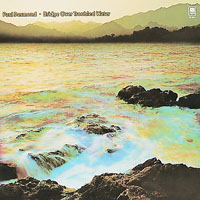 Bass Playing and More
Bass Playing and More AAJ: Getting ready for this interview I've gone back and listened to Push Push a couple of times, and I've got to say, after 40 years it still holds up really well. As I listened to it, it made me think of the notion that bass players seem to kind of tap into the vibe of the human heart beat. It was cool, often, even within a nice groove, that seemed to be going on. Is that a conscious thing with bass players?
JJ: For me, a lot of my playing is coming out of being a dancer and my experience of playing a lot of dance music. So when you hear me playing, it's me imagining people dancing or moving. That's very important to me. So that's what I'm tapping into, but if it comes out as a heartbeat, that's great.
AAJ: That dance analogy is really apt, and that makes me think of something Jaco Pastious said during your interview. He said he thought bass was the most important instrument in the band because it's connected to rhythm and to harmony, so in a way, simultaneously you're in a rhythmic dance with the drummer, and in a dance of harmony with the soloist. That makes it a tricky instrument in a way, and maybe the general public doesn't think of that, but musicians certainly appreciate that.
JJ: Bass can be in-your-face, but there is also a kind of subliminal approach that I favor. You know like that heartbeat things, that's what struck me, you know Paul Chambers, he was always there. Of course the bass wasn't recorded that well then, so you couldn't hear him that well to begin with.
So when I started and listened to music, I often had to kind of imagine what the bassist was playing. So working as a dance partner evolved out of that. So it is tricky being a dance partner with the rhythm and doing a duet with the melody.
There are different approaches. Some players stick to the realm of the accompaniment, and some explore more interplay with the soloist or the melody. My style involves a lot of interplay and improvisation. So it's like a level of tiers, where the melody is first, the drums and rhythm is second, and then comes everything else.
The other instruments are often sweetening the sound, and if I'm listening to them, I can play less. Usually, the more instruments there are, the less I have to play. So it depends, but actually I'm playing everything in my head, so what I'm doing is subtracting things.
AAJ: It's been interesting for me as I prepared for this interview, as I've listened to music lately I've had my "bass" ears on. I was listening to Bob Marley's album Natty Dread (Island, 1974) and it really struck me how he framed his music completely around the bass. I imagine Bob Marley's music is a very satisfying for bass players.
JJ: For sure. Aston Barrett, known as Family Man, was often playing a very sophisticated sub-melody and at the same time maintaining rhythmic posts. It's an incredible style of music and I love playing it, it's a lot of fun. And with that sub-melody, you're carrying a lot, and along with the melody, it's really pronounced.
AAJ: It seems like bass players often have real melodic gifts, and it also seems like lots of them are accidental bass players, like Jaco, Mingus, Paul McCartney, Sting, and Brian Wilson.
JJ: I encourage my students to research the influences of players who inspire them. For me it was Paul Chambers, and I discovered he came to bass from the saxophone. So that would explain his soloing, but what captivated me about him was his rhythmic playing, his walking bass, that's the function of the bass that appeals to me, and my specialty.
I grew up around music, my grandfather even had a bass, but I don't recall him playing it. I went to young people concerts at Carnegie Hall and knew all the instruments, but I had no inclination to play an instrument at all. But that all changed when I heard Paul Chambers play, I thought, "I want to do that!" His walking style, it was melodic and rhythmic. After that I never wanted to play anything but the bass.
So I never had the desire to play anything else, but I like to listen to singers and saxophone players who were my mentors. I never liked to listen to bass players because I didn't want to copy anybody.
AAJ: In all your studio work, did you ever happen to work with Burt Bacharach?
JJ: Yes, I did a session with Dionne Warwick once, and Paul Griffin was on piano. It was all chart reading and I guess I did my thing.
AAJ: A recent interview with him caught my attention, he said: " 'Ain't No Mountain High Enough' by Diana Ross could easily be the greatest record ever made. You listen to the bass line on there by James Jamerson. That Motown house band, that rhythm section. Wow." I thought that was telling, when he talked about the record he thought was perhaps the greatest, he made special mention of the bass.
JJ: That's especially interesting because his records aren't very bass-oriented.
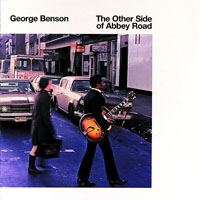 Lost Friends and Legends
Lost Friends and Legends AAJ: Last month we lost a couple of legendary figures in R&B, Johnny Otis and Etta James.
JJ: I feel deep appreciation and gratitude for what they've done and accomplished. I didn't have the good fortune to work with them, but they left an imprint on the world. Johnny Otis had quite a life story, I just read it for the first time. It's amazing, when people are given the opportunity, and this a something distinguishes us from the animals—the ability to change and morph into a new being by adapting to another culture. We can follow our hearts, but animals are stuck in their environment, they change and adapt, but we do it with intent. We go for it; we'll build that tree- house, and do it right now.
AAJ: Now we've just lost Whitney Houston, and as I thought about her it struck me that you probably knew her through Cissy Houston, before she was even an adult?
JJ: Exactly. I got a call from someone who said to me, "You remember little Whitney, Cissy brought her along to the studio when we recorded 'Think.'" She was probably a little five year-old, you wouldn't notice her.
But I'd see her from that time on, and then I'd start hearing about her. I did have close contact with her because I worked at a club where her mother was doing a show. Whitney and her brother Gary were singing backup for their mother, and they each had solo spots.
This would have probably been around 1983 before she had broken out. I remember Clive Davis coming to the club Sweet Waters. You know you hear about people in the industry, but I had never met Clive before that.
She was a sweet kid, and she was around her parents and behaving accordingly, but I sensed there was some wild energy under there. When she married Bobby Brown, you know it struck the people in the community who knew and observed her over the years as kind of strange. But I believe in my heart she just had an inner urge to kind of like let it all hang out, and feel comfortable about what she was doing. Of course a lot of times when you're doing something like that, you're really running away from something, you're escaping.
The thing about Mike Bloomfield, Jaco, and Duane Allman is that they excelled on their instruments, but they also excelled in crossing cultural boundaries in terms of the music styles they incorporated. That was a part of their brilliance and kind of gave them a song to sing with their own voice. And all of them heard music, and I can say that about Whitney Houston too. Her instrument was such that she could sing anything, and not in a stereotypical fashion as a black vocalist moving around. She just stood and delivered, almost like a jazz singer in the pop medium.
AAJ: I can only tell you of a few people I remember seeing for the first time, and Whitney Houston was one of them. I'd heard her before, but hadn't seen her. It was on German television, when they carried the 1987 Grammy Awards, and she sang "The Greatest Love." She walked down these stairs and she was like a living doll, just perfect. A beautiful figure and angelic good looks, and that voice, it could give you goose bumps that didn't go away.
This always stuck with me, and you can watch it on YouTube, when she finished, the camera panned to the audience, and the very first person to get to his feet for a standing ovation was B.B. King!
JJ: That's B.B., he'd give it up! He's a true gentleman, and he shows his love.
Buddhism
AAJ: Didn't I read somewhere that King Curtis appeared to you after he died, and that started you on the path to Buddhism?
JJ: Norman called me at 8 o'clock on the night he died and told me exactly what happened, blow for blow. And the next morning I'm in my kitchen in Yonkers, and there he is hovering above the cabinets. That event turned my life around because I started looking for answers.
Before that I thought everything revolved around the essence of my being in the "now." I believed in cause and effect, but I only associated it with the present. I'd never considered the possibility of the past, present, and future being one, which is what Buddhism led me to.
So you start connecting the dots. An analogy I like is an iceberg, when you look at it, the part you see represents the present, but the three quarters you don't see represents the past. And because the iceberg is melting, you're also seeing the future.
The future is endless, and the actuality of eternal life is something we need to reckon with.
AAJ: How long did it take you to make the leap to Buddhism after you had the vision of King Curtis?
JJ: It took me two years, the summer of 1973, and I received my Gohonzon on February 9, 1974.
It took me a while, I started looking and digging. First I tried Kundalini Yoga, I looked into existentialism, numerology, astrology—you know, looking for something that made sense to me. When I came upon True Buddhism I became aware of karma, and that tied everything together for me. Our existence rests upon the concept of karma and everything is related.
AAJ: How has this affected you as a musician? Are you more selfless and empathetic?
JJ: By nature, playing the bass I was always empathetic anyway—that's the nature and supportive position of the instrument. I would say it has given me more openness and freedom to express myself.
AAJ: And the chanting, is that a calming thing?
JJ: I'd say it's more invigorating. When I finish chanting I'm fired up and ready to go. I don't do anything until I've had my morning prayer service which takes place twice a day. But really I don't think about it anymore because it is so intertwined with my life. In the course of the day there are a lot of opportunities to do things, to correct things, and to be more focused.
It's wonderful to have that rope to hang on to, and to pull ourselves out of the darkness and into the light. That's why the arts are so important, it's something that enlightens us and focuses us on the higher aspect of ourselves—as opposed to mass media, with art you have to focus and spend time with it. It's very rewarding.
My commitment to it comes from the actual proof of the process. You can believe and have faith, and that's cool, but when you actually see proof and results, you realize it's something you want to stick with.
So we try to serve, and to manifest the Buddha of intrinsically perfect wisdom in our lives, and that encompasses the past, present, and the future. Yet I'm not thinking of the past and future, I'm focused on being in the present with all I've got.
AAJ: People interested in learning more can find information on your website right?
JJ: Right. There's information about the True Buddhism, some of my discography with audio clips, info about my gear, I do clinics and teaching via Skype, tour dates, my latest book, an Ebook, There's Music In Everyone! (C Souler Energy, 2008), and other stuff.
As far as what I'm doing now, I'm trying to get my teaching methods placed in institutions and programs outside my workshops. I've been working with the Mississippi Arts Commission to get something going on the community or university level. Other than that, it's all about the fans and making music better, that's been my mission, to pass something on to the next generation.
AAJ: I'd say, mission accomplished.
JJ: [Laughing] Yeah, I'd say I've done that! But I have to continue and try to make my methods accessible to more people, not just musicians, by putting an appreciation of music in the hands of the average person. A little understanding can go a long way.
Selected Discography
Al Kooper, Mike Bloomfield, Al Kooper, Mike Bloomfield Fillmore East: The Lost Concert Tapes 12/13/68 (Columbia, 2003)
Ben E. King, Supernatural (Atlantic,1975)
Jimmy McGriff, Black and Blues (People Records, 1973)
Herbie Mann, Turtle Bay (Atlantic, 1973)
Archie Shepp Attica Blues (Impulse/Abc, 1972)
Eddie Palmieri, Harlem River Drive (Roulette, 1971)
King Curtis, Live at Fillmore West, (Atco, 1971)
Aretha Franklin, Aretha Live At Fillmore West (Atlantic, 1971)
Herbie Hancock, Mwandishi (Warner Archives, 1971)
Les McCann & Eddie Harris, Second Movement (Atlantic, 1971)
Richard "Groove" Holmes, Comin' On Home (Blue Note, 1971)
Herbie Mann, Push Push (Atlantic, 1971)
Rascals, Freedom Suite (Atlantic, 1969)
George Benson, The Other Side Of Abbey Road (A&M, 1969)
Freddie Hubbard, A Soul Experiment (Atlantic, 1969)
Paul Desmond, Bridge Over Troubled Water (A&M, 1969)
Shirley Scott, Shirley Scott And The Soul Saxes (Atlantic, 1969)
Aretha Franklin, Aretha Now (Atlantic, 1968)
Freddie King, Freddie King Is A Blues Master (Atlantic, 1968)
Photo Credits: Page 1: Susea of Hittin' the Note; Pages 2, 3: Courtesy of Jerry Jemmott; Page 8: Dragan Tasic.
Tags
Jerry Jemmott
Talkin' Blues
Alan Bryson
United States
B.B. King
Duane Allman
Allman Brothers Band
Herbie Mann
Johnny Winter
Aretha Franklin
Ray Charles
Freddie King
Otis Rush
warren haynes
Derek Trucks
Cornell Dupree
Bernard Purdie
King Curtis
Jimmy Herring
Jaco Pastorius
Gregg Allman
Bob Dylan
Al Kooper
James Brown
Herb Lovelle
Champion Jack Dupree
Jimi Hendrix
The Beatles
Nina Simone
Susan Tedeschi
John Coltrane
Steve Potts
Paul Desmond
Charlie Parker
Gil Scott-Heron
archie shepp
Les McCann
Eddie Harris
Idris Muhammad
Lester Young
Cannonball Adderley
Yusef Lateef
Walter Booker
Horace Silver
Jazz Messengers
Count Basie
Carmen McRae
Paul Chambers
bob marley
James Jamerson
Johnny Otis
Etta James
PREVIOUS / NEXT
Support All About Jazz
 All About Jazz has been a pillar of jazz since 1995, championing it as an art form and, more importantly, supporting the musicians who make it. Our enduring commitment has made "AAJ" one of the most culturally important websites of its kind, read by hundreds of thousands of fans, musicians and industry figures every month.
All About Jazz has been a pillar of jazz since 1995, championing it as an art form and, more importantly, supporting the musicians who make it. Our enduring commitment has made "AAJ" one of the most culturally important websites of its kind, read by hundreds of thousands of fans, musicians and industry figures every month.



